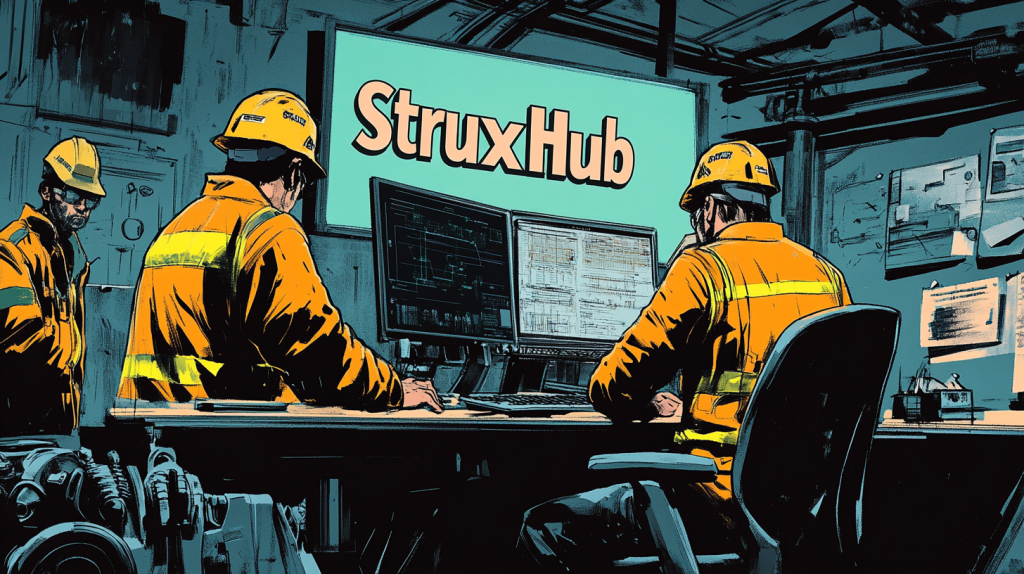Data Center Construction Vendor Coordination: How to Manage Supplier Logistics and Vendor Coordination in Data Center Construction
Table of Contents:

Coordinating vendors and suppliers in data center construction is no small task. With multiple stakeholders, tight deadlines, and critical infrastructure requirements, seamless vendor coordination is essential to avoid delays, cost overruns, and operational inefficiencies.
From sourcing high-performance electrical systems to aligning HVAC installation with server deployment, vendor logistics in data center construction require a structured approach to ensure timely execution, compliance, and quality control.
This guide covers the key strategies, best practices, and logistical frameworks necessary to streamline supplier coordination in data center projects. Whether you’re working with general contractors, specialized vendors, or third-party suppliers, mastering vendor management will help you optimize timelines, reduce risks, and ensure operational success.
Integrating Sustainable Procurement Practices in Vendor Coordination
Sustainability is no longer an afterthought in data center construction—it’s a critical priority. With growing demand for energy-efficient, environmentally responsible infrastructure, vendor coordination must align with sustainable procurement goals.
Sourcing Green-Certified Suppliers
Choosing vendors who meet sustainability standards ensures compliance with LEED, BREEAM, and Energy Star certifications. Partnering with environmentally responsible suppliers offers:
- Lower carbon footprint by sourcing locally and reducing transportation emissions.
- Energy-efficient materials that enhance thermal management and reduce operational costs.
- Recyclable and biodegradable construction materials to support circular economy initiatives.
Optimizing Supply Chain Sustainability
To achieve sustainability in vendor logistics, teams must:
- Prioritize renewable energy solutions like solar-powered cooling systems.
- Implement waste reduction strategies such as material repurposing and minimal packaging requirements.
- Track supplier sustainability scores to ensure long-term compliance and performance improvements.
By integrating sustainable procurement practices, data center projects can achieve lower operational costs, regulatory compliance, and long-term energy savings.
Understanding Vendor Coordination in Data Center Construction
Vendor coordination in data center construction involves managing multiple contractors, suppliers, and service providers to ensure that all components—from power infrastructure to cooling systems—are delivered, installed, and tested on schedule.
A well-coordinated approach helps:
- Prevent supply chain bottlenecks that could delay construction timelines.
- Ensure compliance with industry regulations (Uptime Institute, ANSI/TIA-942, ASHRAE).
- Align construction phases with IT equipment deployment schedules.
- Enhance communication between stakeholders to minimize operational conflicts.
Key Challenges in Vendor Logistics
Managing vendors in data center construction presents unique challenges:
- Multiple Specialized Suppliers: Electrical, HVAC, network cabling, security systems, and backup power must be sourced from different vendors.
- Strict Compliance & Certification Standards: Vendors must meet industry regulations to ensure data center uptime and reliability.
- Supply Chain Delays & Material Shortages: Equipment lead times can impact project schedules if not planned properly.
- Complex Installation & Integration Requirements: Vendors must coordinate with construction teams, network engineers, and IT specialists to align project phases.
Successfully navigating these challenges requires a structured vendor coordination framework that enhances efficiency and accountability.
Related Articles:
Sustainable Data Center Construction: Best Green Building Practices for Sustainable and Mission-Critical Data Center Construction
Data Center Construction Compliance: Top Tools for Streamlining Permits and Compliance in Data Center Construction
Data Center Construction Delivery Coordination: Efficient Scheduling Strategies for Modular Data Center Equipment Installations
Building an Effective Vendor Coordination Plan
A vendor coordination plan is essential for aligning supplier activities with your data center construction schedule. This ensures that all vendors deliver the right materials, at the right time, while meeting quality and compliance standards.
1. Establish Clear Vendor Roles & Responsibilities
Before construction begins, define:
- Scope of work for each vendor, outlining deliverables, schedules, and compliance requirements.
- Communication protocols to streamline collaboration between suppliers and project managers.
- Accountability measures for contract enforcement and performance tracking.
Clear documentation prevents overlaps, miscommunication, and delays, ensuring each vendor understands their role in the project.
2. Implement a Centralized Vendor Management System
Using construction management software can streamline vendor tracking, logistics, and communication. These platforms provide:
- Real-time material tracking & delivery scheduling.
- Automated compliance documentation to ensure vendors meet industry regulations.
- Live dashboards for monitoring vendor performance and resolving issues proactively.
Popular tools like Procore, StruxHub, Autodesk Build, and Oracle Primavera help unify vendor coordination and project oversight.
3. Optimize Supply Chain Logistics & Material Delivery
Delays in equipment and material deliveries can disrupt data center construction timelines. Prevent supply chain bottlenecks by:
- Establishing priority vendor contracts for mission-critical components like backup generators, fiber optic cabling, and cooling units.
- Coordinating just-in-time (JIT) deliveries to avoid storage challenges on-site.
- Leveraging predictive analytics to forecast material demands and prevent shortages.
By aligning vendor logistics with project milestones, you ensure that the right materials arrive precisely when needed.

Best Practices for Vendor Communication & Collaboration
Smooth vendor coordination relies on clear, proactive communication between contractors, suppliers, and project managers. Here’s how to enhance collaboration:
1. Conduct Regular Vendor Coordination Meetings
Hosting weekly vendor meetings ensures all stakeholders are aligned on progress updates, upcoming deliveries, and risk mitigation strategies.
Key discussion points should include:
- Work-in-progress updates from each vendor.
- Schedule adjustments due to delays or site readiness concerns.
- Safety & compliance checks to prevent last-minute regulatory issues.
2. Create a Standardized Documentation Process
Using standardized templates for vendor reporting, contract management, and compliance documentation improves efficiency and accountability.
Recommended documentation includes:
- Vendor performance reports tracking delivery accuracy and project adherence.
- Risk mitigation logs identifying potential delays and resolution strategies.
- Change order request forms for tracking vendor modifications to the project scope.
A structured approach to documentation minimizes disputes and enhances project transparency.
3. Enforce Contract Compliance & Performance Metrics
Hold vendors accountable with defined key performance indicators (KPIs) such as:
- On-time delivery rates (percentage of materials delivered within scheduled timeframes).
- Quality assurance pass rates (percentage of inspections meeting required standards).
- Incident resolution efficiency (average time taken to resolve vendor-related issues).
By enforcing clear performance metrics, you can identify underperforming vendors early and take corrective action.
Related Articles:
Best Guide to Data Center Construction Management Software: Manage Scheduling, Deliveries, and Compliance for Hyperscale Projects
Data Center Construction Deliveries: Best Real-Time Tracking Solutions for Managing Data Center Construction Deliveries
Data Center Construction: Top Delivery and Scheduling Strategies for Redundant Power Systems in Data Centers
Leveraging Technology for Vendor Coordination
Modern data center construction projects require integrated technology solutions to manage vendors and logistics efficiently.
Construction Management Software
Platforms like StruxHub, Procore, and Autodesk Build streamline vendor coordination with:
- Automated scheduling & workflow tracking.
- Centralized communication portals for real-time updates.
- AI-driven risk assessment tools to identify potential delays before they happen.
AI & Predictive Analytics for Supply Chain Optimization
AI-powered analytics can predict vendor lead times, identify potential bottlenecks, and recommend supply chain adjustments based on real-time project data.
Benefits include:
- Reduced risk of material shortages.
- Automated compliance verification.
- Real-time vendor performance tracking.
By integrating AI-driven tools, project managers can optimize data-driven vendor coordination strategies that enhance efficiency and mitigate risks.

Coordinating Multi-Vendor Installation & Testing Phases
A data center project requires seamless coordination among electrical, mechanical, networking, and security system vendors. Poor scheduling and misalignment lead to delays, workflow conflicts, and expensive rework.
Strategic Installation Sequencing
Coordinating installations across multiple vendors ensures each phase progresses without interference. Best practices include:
- Prioritizing electrical and cooling system setups before deploying server racks and networking hardware.
- Scheduling phased installations to prevent congestion and overlapping work areas.
- Integrating modular construction approaches to enable faster deployment and on-site assembly.
Aligning Vendor Teams with Commissioning Phases
Data centers require extensive testing and commissioning before becoming operational. Proper vendor coordination helps:
- Ensure HVAC and power systems undergo reliability testing before IT infrastructure setup.
- Align cabling and networking vendors with final deployment schedules to prevent conflicts.
- Conduct joint system integration tests to confirm all components function cohesively before project handover.
By implementing a structured installation and testing plan, project managers can reduce timeline risks, improve quality control, and enhance project efficiency.
Vendor Risk Management & Contingency Planning
Even with the best coordination, unexpected vendor delays, material shortages, or compliance issues can arise. A strong risk management framework helps mitigate these disruptions and keeps projects on track.
Establishing a Multi-Tier Vendor Network
Relying on a single supplier for critical components is a major risk. Instead, teams should:
- Develop pre-qualified backup vendor relationships for key infrastructure components.
- Source redundant supply chains to ensure availability of essential materials like cooling units, power distribution hardware, and cabling.
- Create vendor performance tracking systems to quickly identify and replace underperforming suppliers.
Proactive Risk Monitoring & Compliance Management
Tracking vendor risks in real time helps prevent last-minute issues. Essential risk mitigation strategies include:
- Implementing predictive analytics tools to identify potential supply chain disruptions.
- Using automated compliance tracking to ensure vendors meet regulatory requirements.
- Defining penalty clauses in vendor contracts to hold suppliers accountable for delays.
A proactive approach to risk management ensures minimum disruptions, faster problem resolution, and a stable vendor ecosystem.
Vendor coordination in data center construction isn’t just about keeping suppliers on schedule—it’s about creating a synchronized ecosystem where every contractor, supplier, and stakeholder works in harmony.
By implementing structured logistics planning, real-time tracking, risk mitigation strategies, and sustainable procurement practices, project managers can reduce inefficiencies, prevent costly delays, and ensure smooth deployment.
With tools like StruxHub’s vendor management platform, teams can streamline communication, track progress in real time, and automate scheduling—eliminating manual inefficiencies and improving collaboration.
Ready to optimize vendor coordination for your next data center project? Let StruxHub help you take control of your supply chain, improve communication, and drive project success.

Unlock the Full Potential of Your Construction Projects with StruxHub
StruxHub enhances efficiency and coordination across all project phases, providing a single source of truth that eliminates silos and fosters collaboration. Real-time updates, financial management tools, and seamless commvunication features ensure that all team members and stakeholders are aligned and informed, reducing the risk of errors and delays. With comprehensive solutions for document management, risk mitigation, and quality control, StruxHub maintains project integrity and safety, while mobile access and integration capabilities further enhance project flexibility and efficiency.
StruxHub’s Key Features and Benefits:
- Advanced Delivery Management: Automate and optimize your delivery schedules, ensuring materials arrive just in time, every time.
- Site Communication: Utilize georeferenced maps and instant messaging to keep every team member informed and aligned.
- Construction Materials Management: Track inventory levels and manage materials procurement with ease, reducing waste and avoiding project delays.
- Construction Safety & Inspection Workflows: Implement customizable mobile forms for conducting safety inspections and managing compliance documentation effortlessly.
- Short-Term Scheduling: Visualize project tasks with detailed floor plans, linking each activity to specific locations for better planning accuracy.
- Construction Resource Management: Efficiently allocate personnel and equipment, maximizing productivity and reducing idle time.
StruxHub’s Product Offering:
- StruxHub Deliveries: Simplifies the coordination of incoming deliveries, ensuring materials and equipment are precisely timed to project needs.
- StruxHub Logistics: Offers intelligent site logistics planning, from crane scheduling to space allocation, for smoother operations.
- StruxHub Safety: Elevates on-site safety standards with easy-to-use tools for inspections, permits, and incident reporting.
- StruxHub Scheduling: Enhances project timelines with intuitive scheduling tools that ensure tasks are completed efficiently and on time.
With StruxHub, construction companies can look forward to a streamlined, more efficient project execution that delivers on time and within budget. Embrace the power of innovation and take your construction projects to the next level.
Don’t miss out on the opportunity to optimize your construction management processes with StruxHub. Sign up for a free demo today. Let’s build smarter, together.

StruxHub
Experience the power of StruxHub today and witness firsthand how it can revolutionize your construction operations.
FAQ
1. What are the biggest challenges in vendor coordination for data center construction?
Vendor coordination in data center construction comes with multiple challenges, from managing specialized suppliers to ensuring compliance with strict industry regulations. One of the biggest issues is supply chain disruptions, which can delay the delivery of critical materials like power distribution units, fiber optic cabling, and cooling infrastructure. Without a proper logistics plan, these delays can cause cascading project setbacks.
Another challenge is communication gaps between stakeholders, including contractors, vendors, and IT specialists. Misalignment in schedules or unclear expectations can lead to workflow conflicts, costly rework, and compliance risks. Data center projects must also meet specific regulatory requirements (such as ANSI/TIA-942 or Uptime Institute Tier Standards), making it essential to work with vendors who understand these compliance needs.
Lastly, coordinating installations across multiple vendors—from HVAC to network infrastructure—requires a structured timeline and quality control process to ensure systems integrate properly. Without a centralized vendor management system, tracking performance, deliveries, and contractual obligations becomes overwhelming. Using tools like StruxHub can help mitigate these risks by automating schedules, centralizing communication, and providing real-time project visibility.
2. How can technology improve vendor coordination in data center projects?
Technology plays a vital role in streamlining vendor coordination by offering real-time tracking, automation, and predictive analytics. Traditional vendor management relies on manual tracking, spreadsheets, and emails, which can lead to miscommunication, scheduling errors, and inefficiencies.
By using construction management software, project managers can:
- Automate scheduling to ensure vendors meet deadlines.
- Monitor supplier performance in real time to address issues before they escalate.
- Centralize communication so all stakeholders stay informed on project status.
AI and predictive analytics further enhance vendor coordination by forecasting supply chain risks. For example, AI-driven software can analyze historical data and market conditions to predict potential material shortages or delays before they happen. This allows project managers to proactively adjust schedules or source alternative suppliers to avoid disruptions.
In addition, cloud-based documentation management ensures that all vendor contracts, compliance certifications, and quality control reports are stored securely and easily accessible. Platforms like StruxHub integrate these features, making it easier to coordinate vendors, manage risk, and keep data center projects on track.
3. What role does predictive analytics play in supply chain logistics?
Predictive analytics is transforming vendor coordination and supply chain logistics by helping project managers anticipate and mitigate risks before they impact construction timelines. In data center projects, delays in key material shipments—such as backup generators, cooling units, or networking equipment—can cause severe operational setbacks.
With AI-driven predictive analytics, construction teams can:
- Identify potential bottlenecks in material procurement.
- Forecast vendor performance based on historical data.
- Automate inventory tracking to ensure just-in-time (JIT) deliveries align with project schedules.
For example, if a data center project relies on a vendor for high-density fiber optic cables, predictive analytics can assess previous lead times, market trends, and supplier reliability to determine if a delay is likely. If so, the system can recommend alternative sourcing options or early procurement to avoid project disruptions.
Furthermore, predictive analytics can enhance cost forecasting by analyzing market fluctuations and global supply chain disruptions, ensuring that project managers make data-driven procurement decisions. Tools like StruxHub integrate these AI capabilities, allowing for real-time vendor performance tracking and risk mitigation.
4. How do you ensure compliance when working with multiple vendors?
Ensuring compliance in data center construction is critical, as industry regulations govern everything from safety protocols to energy efficiency standards. When working with multiple vendors, a structured compliance verification process is necessary to prevent legal and operational risks.
The first step is to establish clear compliance requirements at the start of vendor negotiations. This includes:
- Industry certifications (ANSI/TIA-942, Uptime Institute, ASHRAE standards).
- Worksite safety protocols (OSHA compliance for contractors and subcontractors).
- Quality assurance benchmarks to ensure all materials meet durability and energy efficiency standards.
To streamline compliance, vendor management software can automate documentation tracking, flagging any missing or outdated certifications. Additionally, pre-construction audits help verify whether vendors meet contractual obligations before they start work on-site.
Regular compliance reviews—conducted via scheduled inspections, automated reporting, and digital record-keeping—help identify potential issues early. For example, if an electrical contractor fails to meet NFPA 70 (National Electrical Code) standards, the system can trigger corrective action protocols before it impacts construction milestones.
By using automated compliance tracking and structured vendor oversight, project managers can avoid costly violations, maintain safety standards, and ensure project success.
5. How can StruxHub improve vendor coordination in data center construction?
StruxHub is designed to streamline vendor coordination, optimize logistics, and improve communication across all phases of data center construction. Unlike traditional project management methods that rely on manual tracking and siloed communication, StruxHub provides a real-time, cloud-based platform to centralize vendor operations.
Key benefits include:
- Automated scheduling & workflow tracking: Ensures vendors align with project milestones.
- Centralized communication portals: Reduces miscommunication by keeping all stakeholders informed.
- AI-powered risk assessment: Identifies potential delays, supply chain risks, and vendor performance issues before they impact project timelines.
- Real-time material tracking: Helps monitor deliveries, inventory levels, and vendor compliance.
By integrating StruxHub into vendor coordination strategies, project teams can:
- Reduce construction delays by improving scheduling accuracy.
- Enhance collaboration with transparent project updates & reporting.
- Minimize supply chain disruptions through predictive analytics & alternative sourcing.
StruxHub simplifies the complex logistics of vendor coordination, helping project managers maintain efficiency, reduce costs, and improve overall construction outcomes.




